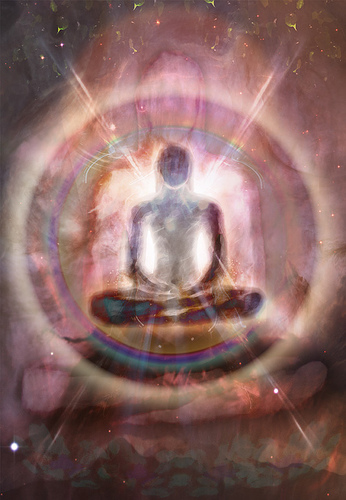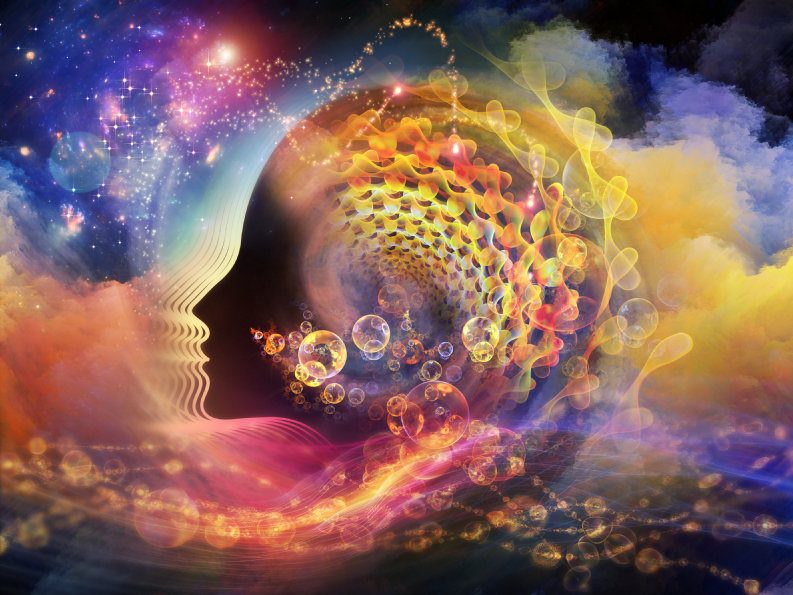Hawks screech from different directions in the parkland, and birds play raucously. Friendliness and joy are reflected in the faces of many of the using the park for every conceivable activity—walking, running, horseback riding, biking and rollerblading.
What is the watcher that always seems separate from what it is watching? Until observation ends the observer, and quiets the mind and cleanses the heart, one doesn’t really see the rippling green water of the stream, or anything or anyone. But then everything is vivid and new—the stream and sky, the animals and people. And one enters a dimension beyond sorrow.

I dislike the term ‘mystical experience.’ What happens in the brain during the meditative state is neither mystical, nor an experience. To my mind it’s an event, a phenomenon that is new each time it occurs.
Effortlessly watching every mental and emotional reaction, without judging or controlling the memories and feelings that arise in the moment, is the only action that is needed to awaken the meditative state.
Through passive observation, the brain has the capacity of gathering attention that is quicker than thought. Effortless attention then acts on thought to silence it. This can happen within anyone, if they understand how to observe the movement of thought without interference.
There are two levels of psychological reaction. There are spontaneous reactions, such as when part of a conversation one had yesterday replays in the mind when sitting quietly. And there are secondary reactions, when we judge and evaluate what we said during that conversation. These secondary reactions of the self have to end for the chattering mind to fall silent.
We experience both types of reactions as arising from the ‘me,’ a seemingly independent entity that forms the basis of our existence. But the ‘me’ is not separate from the entire movement of thought. It has no more independent existence than the homunculus, the fully formed human being that was once thought to exist inside an egg or spermatozoa.
Then why is the self/ego so deeply embedded at the emotional level? Is it that man made a wrong turn many thousands of years ago when the self was formed and identified with particular tribes for security? And now this existential mistake, because it has been made for so long, is believed to be unchangeable ‘human nature?’
Whatever the roots of man’s wrong turn, when awareness is quick and energetic enough within one to see through the habit of the mind continually dividing itself off from itself, the illusion of the separate observer, the ‘me,’ dissolves in observation.
Sitting quietly and questioning the observer draws attention to the deep habit of separating the thinker from thought. There is actually just a single muddy stream of content in consciousness. That is consciousness, as we usually know it. Without thought continuously splitting off as the watcher in an infinite regress however, there is simply the watching that leads to wholeness.

With the cessation of the divisive mechanism of the watcher, attention grows within one with the intensity of a hawk. Undirected attention (as contrasted with concentration) is the highest action, and it quiets the mind without one having to ‘do’ anything. Thought slows down, and stops altogether. Sensory impressions, no longer mediated by words, images and memories, are heightened. Color, sound, sight, smell and touch become vivid again.
There is in this sensitive awareness a deepening state of insight and compassion. And in awakening the meditative state, the brain is renewed, and remains young. Finally, in the completely unforced stillness of attention, the brain is aware of energies and essences beyond words and description.
Such states have been called, devotionally or derisively, ‘mystical experiences.’ But they aren’t mystical, personal or idiosyncratic. Rather, so-called mystical experience is universal, and open to anyone who has an insight into psychological division and undivided observation.
If one experiments with observation, taking both a serious and playful attitude, the ‘doors of perception’ open. Don’t make a goal of it, but simply take the time, in nature whenever possible, to sit quietly and watch everything inclusively, outside and inside.
Martin LeFevre

